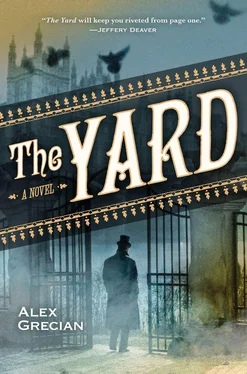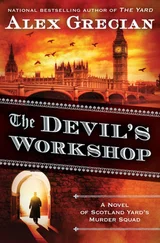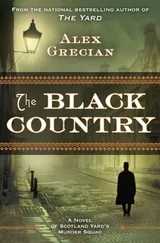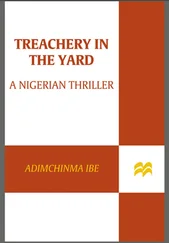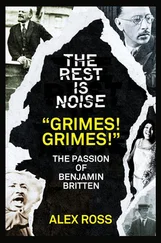Alex Grecian - The Yard
Здесь есть возможность читать онлайн «Alex Grecian - The Yard» весь текст электронной книги совершенно бесплатно (целиком полную версию без сокращений). В некоторых случаях можно слушать аудио, скачать через торрент в формате fb2 и присутствует краткое содержание. Год выпуска: 2012, Издательство: Penguin Group, Inc., Жанр: Исторический детектив, на английском языке. Описание произведения, (предисловие) а так же отзывы посетителей доступны на портале библиотеки ЛибКат.
- Название:The Yard
- Автор:
- Издательство:Penguin Group, Inc.
- Жанр:
- Год:2012
- ISBN:нет данных
- Рейтинг книги:5 / 5. Голосов: 1
-
Избранное:Добавить в избранное
- Отзывы:
-
Ваша оценка:
- 100
- 1
- 2
- 3
- 4
- 5
The Yard: краткое содержание, описание и аннотация
Предлагаем к чтению аннотацию, описание, краткое содержание или предисловие (зависит от того, что написал сам автор книги «The Yard»). Если вы не нашли необходимую информацию о книге — напишите в комментариях, мы постараемся отыскать её.
The Yard — читать онлайн бесплатно полную книгу (весь текст) целиком
Ниже представлен текст книги, разбитый по страницам. Система сохранения места последней прочитанной страницы, позволяет с удобством читать онлайн бесплатно книгу «The Yard», без необходимости каждый раз заново искать на чём Вы остановились. Поставьте закладку, и сможете в любой момент перейти на страницу, на которой закончили чтение.
Интервал:
Закладка:
He pronounced the cause of death for the poor girl at a glance and the nurses cleared the table to make room for a new corpse. There were many more waiting. There always were.
The man next to her had been ill. He had come from somewhere upstairs in the hospital and had been worked over by another doctor. There were small purple wounds on the man’s chest, abdomen, legs, arms, and forehead where leeches had been applied. It was an old method of treatment, and Kingsley had no use for it. Patients who had been bled were invariably weaker and thinner and sicker than when they were first admitted to hospital. Kingsley would have to decide whether to credit the man’s death to illness or malpractice. In similar cases in the past, he had marked bleeding as the cause of death, but the hospital frowned on that. Dr Kingsley had been encouraged to keep his progressive thinking to himself.
There was a bin next to the only empty table in the room. The bin was filled with disembodied limbs, heads, and torsos. There was no mystery as to the cause of death. A man in Mayfair had wheeled the bin into a police station and had confessed to chopping up his entire family in a fit of pique after too much drink. Kingsley had already pronounced cause on the woman and two children whose body parts were mingled in the bin. But he had decided to stitch the three people back together, to make them whole again, before their burial. It seemed only proper.
The bodies of children always bothered Kingsley most.
Many of the other tables’ occupants had been struck down by horses or wagons or stray building materials as they walked in the streets near the hospital. Here a man’s head was stove in and unrecognizable; there a woman’s arm was separated from her shoulder. She had bled to death while the omnibus that hit her had rolled on to its appointed rounds.
Victims of consumption occupied three of the tables near the far wall. They were all razor-thin, their skin marble grey, their clothing spotted with blood. They had slowly coughed up their lives. Kingsley’s own wife had suffered this way, and he avoided looking too closely at their faces, afraid he might see the same dull animal fear that had transformed Catherine. He had carefully compartmentalized the memories of his wife on her deathbed: the bloodstained linens, the long nights, the hoarse moans that had echoed through their home every night. He preferred to remember her as she had been in her prime.
He moved on as he always moved on when those memories surfaced.
The last table in the corner of the room held an old woman’s body. Her throat had been cut as she passed through an alley, her bag stolen. Kingsley had no idea what might have been in that bag. The mugger and murderer had not been caught. Kingsley stood by the table and looked down at the old woman. She seemed peaceful, sleeping, as if she might wake at any moment and ask for a cup of tea. He took her hand and gazed at her untroubled face and allowed himself a moment before turning and unloading the bin of body parts onto the empty table beside it.
There was much to do and the work never ended.
INTERLUDE 3
CHARING CROSS, LONDON, TWO YEARS EARLIER.
Dr Bernard Kingsley stood in the open doorway and surveyed the room. It was long and narrow like a potting shed, with more than thirty tables flanking a tight center aisle. There was just enough room between the tables for a man to walk sideways. There were no windows in the room and only the single door. The ivy that grew along the outside walls of the tiny morgue had pushed through crevices in the wood and moved inside, where streamers of it spilled across the low ceiling. Street sounds echoed through the odd-shaped chamber like the bustle of an open-air bazaar, but the room lacked the breeze or sunlight of such a place. No one had yet noticed Kingsley standing there.
Two men in dirty smocks wandered aimlessly at the back of the room. One of the men had tied a kerchief around his mouth and nose, presumably to filter the stench, which was considerable.
Kingsley took a step farther into the room, letting his eyes adjust to the gloom. He resisted the impulse to gag and reached inside his coat for his pipe and tobacco. Disguising the odor of the dead was the only reason he ever smoked. He blew through the stem and added a pinch of an American blend to the bowl, catching the leftover tobacco in his pouch as it fell. Hard to do in the semidark. He tamped the bowl with his thumb and sucked air in through the dry tobacco, tasting it.
One of the men, the one with the kerchief over his face, saw the flicker of Kingsley’s match and moved toward him as Kingsley drew on the pipe and got a decent flow going. It was a false light; the pipe went out. He tamped again and lit another match. This time smoke billowed around his head. His own private and portable atmosphere.
The man with the kerchief waited patiently as Kingsley made the matches and tobacco pouch disappear back into the recesses of his coat. Kingsley took a long drag and held it. He looked back out at the street, then turned and plunged into the morgue facility.
“Beg pardon, sir,” the man with the kerchief said. “Not s’posed to be reg’lar folk in here while the work’s goin’ on.”
“What’s your name, fellow?” Kingsley said.
“Frances Mayhew, sir. Call me Frank. That over there’s my brother, Henry. But he don’t like to be called Hank on account of it rhymes with me.”
“Frances and Henry. Are you doctors?”
Frank let out a guffaw. The sudden gust of air blew his kerchief up over his eyes. When it had drifted back down over his mouth and nose, Frank bowed and tugged on his forelock.
“No, sir. Not hardly. No call for doctors round here noways. Patients in here’s all dead, don’tcha know.”
“Are you assisting a doctor, then?”
“Like I said, sir, no doctors come round here mostly ever. Ain’t noways to bring these’uns back to life.”
Kingsley brushed past Frank Mayhew and walked down the row of corpses. The tables, three dozen of them, were short, each barely more than a meter long. The young children in that room fit the tables well, but the adults lay with the tops of their heads butted against the walls and their legs dangling off the tables into the corridor. As he walked, Kingsley was unable to avoid brushing against them, setting the legs in motion. He looked back at the rectangle of light that led to the street outside, dead feet swaying back and forth in front of it as if on the verge of escape. Rigor had passed in most of the bodies. They had been lying there long enough for their muscles to become pliable once more.
“This is monstrous,” he said.
“Well, aye, sir. No argument from us there.”
“If you agree, why do you allow these conditions?”
“Due respect, we don’t allow nothin’, sir. Ain’t our place. We does the job as told.”
Kingsley pointed at the one called Henry, who cowered at the back of the room. “You. Are you in charge here?”
“He don’t talk much no more,” Frank said.
“Well, who’s in charge here, then?”
“Nobody.”
“What do you mean, nobody?”
“Well, somebody, I s’pose, but they ain’t come round here in as long as Henry and me’s been here, which is goin’ on a couple months now.”
“Then how did you come to be here?”
“Got choosed out the workhouse.”
“Why were you chosen? What was your experience? Were you a doctor’s aide? An apprentice or student of some sort?”
“’At’s a whole lotta ways of askin’ the same thing, sir. I don’t mean no disrespect, but you’re gettin’ worked up past where you oughta. It ain’t good in here, ’at’s for sure, but Henry and me’s doin’ what we’s told. We ain’t lookin’ for no trouble, and we don’t noways wanna go back to the workhouse.”
Читать дальшеИнтервал:
Закладка:
Похожие книги на «The Yard»
Представляем Вашему вниманию похожие книги на «The Yard» списком для выбора. Мы отобрали схожую по названию и смыслу литературу в надежде предоставить читателям больше вариантов отыскать новые, интересные, ещё непрочитанные произведения.
Обсуждение, отзывы о книге «The Yard» и просто собственные мнения читателей. Оставьте ваши комментарии, напишите, что Вы думаете о произведении, его смысле или главных героях. Укажите что конкретно понравилось, а что нет, и почему Вы так считаете.
